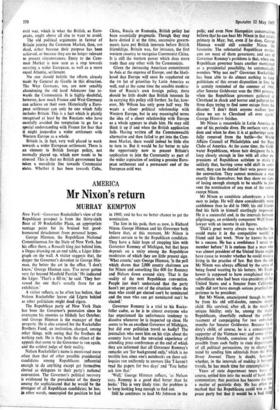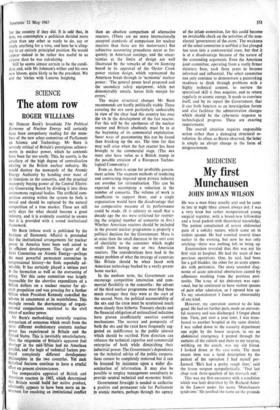Mr Nixon's return
AMERICA MURRAY KEMPTON
New York—Governor Rockefeller's view of the Republican prospect is from the thirty-sixth floor of 30 Rockefeller Plaza, an appropriate vantage point for its bruised but good- humoured detachment from personal hopes.
George Hinman, the Republican National Committeeman for the State of New York, has his office there, a Rouault king just behind him, a Degas drawing on an end table, a Leger litho- graph on the wall. A visitor suggests that, the deeper the Governor's devotion to George Hin- man, the better the art in the office. 'I don't know,' George Hinman says. 'I've never gotten very far beyond Maxfield Parrish.' He indicated the Leger. 'That's a fill-in,' he said. 'They bor- rowed the one that's usually there for an exhibition.'
A visitor reflects, as he often has before, that Nelson Rockefeller leaves old Legers behind as other politicians might dead cigars.
The Republican party of New York State has been the Governor's possession since he overcame his enemies so blithely last October; and George Hinman is the manager of that property. He is also counsel for the Rockefeller Brothers Fund, an institution, charged, among other things, with seeing that the brothers do nothing rash. He is thus both the object of the appeals that come to the Governor to run again, and the coldest judge of their reality.
Nelson Rockefeller's name is mentioned more often than that of other possible presidential candidates among Republicans influential enough to do anything except get themselves elected as delegates to their party's national convention. The Governor's political recovery is evidenced by the prevalence of the theory among the sophisticated that he would be the strongest of all Republican candidates; he has, in other words, reoccupied the position he had in 1960; and he has no better chance to get the nomination.
The lion in his path, then as now, is Richard Nixon. George Hinman and his Governor both believe that, at this moment, Mr Nixon is almost certain to be the Republican candidate. They have a faint hope of stopping him with Governor Romney of Michigan, but that hope depends on a unity among the Republican moderates of which they see little present sign. 'What counts,' says George Hinman, 'is the poll which shows that 2,000 county chairmen are for Nixon and something like 600 for Romney and Nelson down around sixty. That is the reality of the next Republican convention. People just don't understand that the party hasn't yet gotten out of the situation where the man who could get elected can't be nominated and the man who can get nominated can't be elected.'
Governor Romney is a trial to his Rocke- feller cadre, as he is to almost everyone who has experienced his unfortunate tendency to dissolve whenever he is inspected up close. He seems to be an excellent Governor of Michigan, but did ever politician travel so badly? The journalists who meet him on his trips about the country have had the unvaried experience of attending press conferences at the end of which they are informed that all Governor Romney's remarks are 'for background only,' which is no terrible loss since one's notebooks on these col- loquies run uniformly to answers like 'I haven't read the papers for two days' and 'You better ask him that.'
'Well,' George Hinman reflects, 'as Nelson says, Romney is a good deal better than he looks.' This is very likely true; the problem is to keep looking long enough to find out.
Still he continues to lead Mr Johnson in the polls; and even New Hampshire conservatives believe that he can beat Mr Nixon in that state's primary in May; but, even if be does, George Hinman would still consider Nixon the favourite. The substantial Republican moder- ates are most of them governors; and one of Governor Romney's problems is that, when one Republican governor hears another mentioned as a presidential possibility, he automatically wonders 'Why not me?' Governor Rockefeller has been able to do almost nothing to keep politicians of this errant disposition in line; he is acutely reminded of the summer of 1964, after Senator Goldwater won the 1964 primary,
when the Republican governors gathered at
Cleveland in shock and horror and paltered for three days trying to find some escape from the
disaster. 'I don't think anyone realises how close we are to Cleveland all over again,' George Hinman finishes.
Mr Nixon is meanwhile in Latin America in one of his periodic dives. He surfaces very sel- dom and when he does it is at gatherings care- fully removed from the battle—the World Affairs Council of Philadelphia and the Boys Clubs of America. At the same time, the Gold- water Republicans, whose heir designate he is, keep closely enough in line with all other ex- pressions of Republican activism to make it unlikely that, barring some wild shift in senti- ment, they can be denied their veto power over the convention. They cannot nominate a man exactly like themselves; but they show no signs of losing enough strength to be unable to pre- vent the nomination of any man of the centre except Nixon.
Mr Nixon as candidate adumbrates a form easy to judge. He will show considerably more confidence than he did in 1960; his old friends find his faith in himself startlingly improved. He is a successful and, in the intervals between pilgrimages, an evidently competent Wall Stree: lawyer with an income in six figures.
'Dick's great worry always was whether he could make it in the competitive world,' a friend said last week. 'Now he knows he can be a success. He has a confidence I never re- member before.' It is curious that a man who was almost president of the United States might have cause to wonder whether he could make a living in the practice of law. But then the old Mr Nixon was always afflicted by the sense of being found 'wanting by his betters; Mr Eisen- hower is supposed to have complained that a subordinate who had been vice-president of the United States and a Senator from California really did not have enough serious practical ex- perience to be president.
But Mr Nixon, emancipated though he may be from his old self-doubts, remains duty's child. His survival, after all, is the result of unique fidelity; only he, among the major Republicans, cheerfully endured the embar- rassment of campaigning for two unbroken months for Senator Goldwater. Because he is duty's child, of course, he is a conscientious supporter of the Vietnam war; and some of his Republican friends, conscious of the penalty possible from such fealty to state departments of all political persuasions, try to change his mind by sending him editorials from the Wail Street Journal. There is doubt, how ever. whether, in the intervals of making it bet‘een travels, he has much time for contemplation. Years of state department tours haw. of course, settled him into the mould of hard anti- communism; that position has become for him a matter of patriotic duty. He has often re- marked that the Republicans could win as .th! peace party but that it would be a bad data
for the country if they did. It is odd that, in him, we contemplate a politician derided more often than any other as ready to do, say or imply anything for a vote, and here he is cling- ing to an entirely principled position. He would appear indeed to be rather less useful to us sincere than he was calculating.
Still he seems almost certain to be the candi- date and, with Mr Johnson's wither and his own new bloom, quite likely to be the president. We end the 'sixties with Lazarus laughing.































 Previous page
Previous page